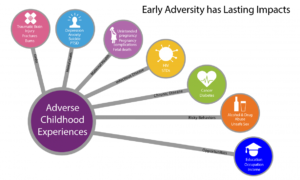 Written by Barbara Amaya with Holly Austin Gibbs
Written by Barbara Amaya with Holly Austin Gibbs
Photography by Shanna Parker
After we had been married for a few years, Jose and I got serious about starting a family. I had never been pregnant before, and, until Jose, I honestly hadn’t given the idea much thought, other than being grateful that I had never become pregnant as a child. I was 12 years old when I first came under the control of Moses, a brutal sex trafficker. I was trafficked for commercial sex by this man for over a decade on the streets of Washington, D.C., and New York City.
During that time, I had heard horrible stories of other girls who had become pregnant and searched out ways to have abortions on their own, so great was their fear of what would happen to the baby if it ended up in the hands of their pimp. I knew one girl whose four-month-old child was already being abused by the man who controlled her. A baby wasn’t something I had ever expected or wanted to have in my future. But, after I was married, I felt differently. Having a baby seemed to be part of the “square life”, and I wanted that for us.
Jose and I tried to get pregnant for quite a while, but without success. With the added pressure of his mother asking for a grandchild, I decided to visit my doctor to ask some questions of my own. “It seems that you have some scar tissue that could be blocking your fallopian tubes,” my doctor told me after the examination. “There is also severe scar tissue in the vagina.” My doctor was compassionate as he explained the findings to me. Unfortunately, conversations like this are far too common among sex trafficking survivors and their medical providers.
In the 1990s, the Centers for Disease Control and Prevention (CDC) and Kaiser Permanente partnered to conduct the “Adverse Childhood Experiences (ACE) Study”, one of the largest investigations of childhood abuse and later-life health and well-being. The original ACE Study was conducted at Kaiser Permanente from 1995 to 1997. Over 17,000 Health Maintenance Organization (HMO) members received physical exams and completed surveys regarding ACEs and their current health status and behaviors. This research team continues ongoing surveillance of ACEs by continuing to assess the medical status and behaviors of study participants.
ACEs were described in the study as child abuse (e.g., emotional, physical, or sexual abuse), child neglect (e.g., emotional or physical neglect), and other household challenges (e.g., mother treated violently, substance abuse in the household, mental illness in the household, parental separation or divorce, and/or a household member had been sent to prison).

The three major findings of this study are as follows:
- ACEs are common across all populations. Almost two-thirds of the study participants reported at least one ACE, and more than one in five reported three or more ACEs.
- Some populations are more vulnerable to experiencing ACEs because of the social and economic conditions in which they live, learn, work, and play.
- The ACE score is the total sum of the different categories of ACEs reported by participants. Study findings show a “graded dose-response relationship” between ACEs and negative health and well-being outcomes. In other words, as the number of ACEs increases so does the risk for negative outcomes.
See the CDC figure for examples of the lasting effects of ACEs. Subsequent studies continue to reveal a relationship between trauma, especially trauma experienced in childhood, and other negative outcomes such as autoimmune diseases and diabetes. For an exhaustive list of negative outcomes, the CDC includes links to selected journal publications.
As a survivor of child sex trafficking, I have been diagnosed with post-traumatic stress disorder (PTSD), heart disease, multiple cancers, and an autoimmune disease, as well as infertility and spinal stenosis. The trauma of enduring multiple rapes for over a decade of my young life caused vaginal scar tissue, damage to my fallopian tubes, and, ultimately, infertility.
Trauma isn’t just “all in the mind” – it leaves a direct physical imprint on the physical body.
Experts today believe that there is a direct biological effect that occurs when a person’s body, especially a child’s body, experiences extreme stress such as the trauma of being sex trafficked. For example, a 2010 study of 117 Minneapolis women found that adults who had “first traded sex as juveniles had worse outcomes in several domains, including unstable housing, higher rates of teenage runaways, higher rates of STDs, lower rates of HIV testing, greater number of sex trades per week, higher incidence of street-based sex trading, and drug use at a younger age.”
Of course, trauma, especially prolonged traumatic stress, can cause long-term negative health and well-being outcomes regardless of a person’s age at which they were first exposed to trauma. General adaptation syndrome (GAS) describes how the body responds to stress, as follows:
- The alarm reaction stage prepares the body for the “fight or flight” response, which we now know includes “freeze” and “fawn” responses as well. For example, the heart rate increases and the adrenal glands release hormones like cortisol and adrenaline.
- The resistance stage occurs after a fight or flight response, as the body slowly begins to recover but remains on high alert for a while. For example, the heart rate and blood pressure begin to normalize and the adrenal glands release lower levels of hormones.
- The exhaustion stage is caused by prolonged stress, which can drain a person’s mental, physical, and emotional resources. This wears down a person’s resilience. It can lead to a weakened immune system and puts the person at risk for stress-related illnesses.
For example, in a 2011 study, 105 Native American women engaged in prostitution were assessed for life circumstances. More than half of the participants (79%) reported that they had experienced sexual abuse as children. The participants also reported that, while engaged in prostitution, 92% had experienced rape, 84% experienced physical violence, and 72% suffered traumatic brain injuries. At the time of the interview, 52% had PTSD and 71% had symptoms of dissociation. This is not surprising considering many of the participants seemed to be surviving daily life in the exhaustion stage. Additionally, 80% of the participants had used substance use treatment services, 77% used homeless shelters, and 65% used domestic violence services.
In another 2014 study, researchers explored the health consequences of sex trafficking among domestic survivors, aged fourteen to sixty. The authors reported that, regardless of the age at which participants were first exploited, or for how long, the participants had “suffered tremendously, virtually without exception”. In “Caring for Trafficked Persons: Guidance for Health Providers”, the International Organization for Migration (IOM) reported that “as is the case with victims of torture, individuals who have been trafficked are likely to sustain multiple physical or psychological injuries and illnesses and report a complex set of symptoms.”
I’ve seen this first-hand. People who have experienced commercial sexual exploitation, particularly those who have been trafficked and subjected to physical violence and multiple abuses over a long period of time, may, and very often do, suffer from long term physical and mental health consequences in a manner consistent with victims of prolonged torture.
Too many have suffered in this way, myself included.
Like many victims of sex trafficking, I received no regular health care, no dental care, and no direct services during my time of victimization. I would visit the emergency room only if I had a serious injury or illness. Otherwise, I was too fearful of Moses, my violent trafficker, to disobey his orders and seek any medical help. Moses would only allow me to seek help in life threatening situations, such as a knife or gunshot wound, a severely painful urinary tract infection (UTI), or after being beaten by him or by those who sought to buy my body.
Victims and survivors of trauma, including sex trafficking, need access to health care services. The ACE Study underscores that, the longer we take to acknowledge the trauma caused by commercial sexual exploitation and sex trafficking and address its potentially damaging effects on the health and well-being of survivors, the greater our chances are for long-term negative health consequences, many of which can lead to disease, disability, and even early death.
As a newlywed, I was fortunate to receive care from a physician who was compassionate and invested in my health. He said he could perform a procedure that would reduce the scarring and damage to my body. And he was right; soon after surgery, I was pregnant with my baby girl.
I cried with joy as I lay in that darkened room, watching the blinking light of my baby’s tiny heart on the ultrasound machine. That a baby could grow inside me at all was amazing. I had worried that my body was poisoned and toxic from the abuse I had suffered; I couldn’t imagine how a pure, innocent little baby could grow inside something as ruined and polluted as me.
It was an incredible feeling to know that I held a life inside me, a beautiful, growing life that depended on me. I felt like it was a miracle.
Maybe, I had thought to myself. Just maybe, I wasn’t so horrible inside.
About the Authors
Barbara is an award-winning author, advocate, speaker, consultant, mentor, trainer, and survivor leader in the movement to finally end human trafficking and child exploitation. Barbara experienced first-hand the juvenile justice and child welfare systems. Then, as a vulnerable child runaway, she experienced the horrific extremes of violence, child abuse, human trafficking, drug addiction, and prison when she was trafficked on the streets of Washington D.C. and New York City for over a decade.
Many victims do not survive before or even after escape. Their experiences are so horrific that survivors often never come back to the ‘real’ world. Barbara not only survived and healed, but truly transformed her life. As a survivor of trauma and adversity, she feels called to share her story and has dedicated her life to educating the public about modern-day slavery. Barbara has been actively raising awareness about the exploitation of children and domestic sex trafficking since 2012. She has a background in education (including a credential in early childhood development), and holds a PhD in psychology.
Learn more about Barbara and order her inspirational book, Nobody’s Girl: A Memoir of Lost Innocence, Modern Day Slavery, & Transformation, at BarbaraAmaya.com.
Shanna Parker is a national Survivor Leader and Subject Matter Expert in the field of Human Trafficking. She is the founder and CEO of Angels Go To Work, where she serves hundreds of youth and young adults yearly in local group homes, campuses and the community. Shanna is a consultant for the Office for Victims of Crime Training and Technical Assistance Center where she assists with program building and specialized training. She sits on panels for multiple research projects with various agencies, and universities.
Shanna also works with multiple tribal agencies to develop responses to trafficking in rural and native lands. Shanna partners with local and federal law enforcement agencies in various capacities including training, consultation, outreach, operations, and victim advocacy. Shanna assists the Arizona Financial Crimes Task Force with the Attorney General’s Office in sex trafficking cases. She also works for Southwest Network as the Anti-Trafficking Coordinator. In this position, she is a consultant for clinical staff and works with several agencies as a specialized mentor and advocate for chronically trafficked youth with a high runaway rate.
To learn more about Shanna and her organization, and to order her memoir, And He Called Me Angel: The Story of a Human Trafficking Survivor, please visit AngelsGoToWork.com.
______________________________________________________________________________
If you are victim, or someone you know is a victim, of labor trafficking or sex trafficking, call the National Human Trafficking Hotline at 1-888-373-7888, or text 233733 (BEFREE).






